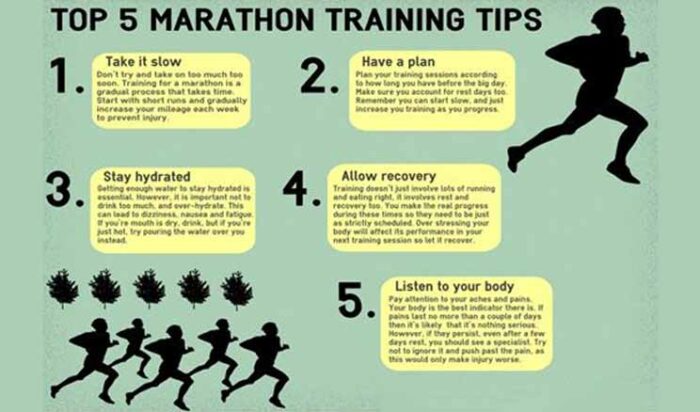Running a marathon is one of the most challenging yet rewarding experiences you can have. Whether you are a beginner or an experienced runner, it takes dedication, commitment, and proper training to cross the finish line. In this blog post, we will provide tips for success in your marathon training journey. We will cover how to get started with marathon training by choosing the right race and setting realistic goals. Additionally, we will delve into essential marathon training gear such as running shoes, clothing, sun protection, and fitness trackers. We will also highlight the benefits of cross-training in marathon preparation that includes strength training, yoga, and stretching. Lastly, we will provide nutrition tips for marathon training such as hydration, fueling for long runs, and recovery nutrition. Get ready to take on your next challenge with these useful tips!
Getting Started with Marathon Training
Setting a realistic marathon goal lays the foundation for long-term success. Consistent training builds aerobic capacity and mileage, while cross-training ensures injury prevention and overall fitness. Adequate rest and recovery weeks are crucial for managing training load, and nutrition plays a significant role in both training and race day performance. Embracing these principles at the beginning of your marathon journey sets you on the right path towards the starting line of your first marathon and ultimately, the finish line.
Choosing the Right Marathon
When selecting a marathon, consider course elevation, race size, and aid station placement. Research reviews and ratings to ensure it aligns with your goals. Pay attention to time goals, pace chart, and tapering period. Check if the training plan fits your level: beginner, intermediate, or advanced. This will help match your ability and ensure a successful first marathon, or half marathon, without introducing unnecessary stress.
Setting Realistic Goals
Setting realistic goals in marathon training involves identifying your target race time, planning your race day strategy and organizing your weekly long runs. It’s important to choose a marathon training plan that aligns with your current base miles and weekly mileage. Throughout your training, be mindful of discomfort, inflammation, and glycogen depletion, while setting incremental milestones to celebrate progress. Focus on building a strong foundation before adding speedwork and interval workouts to your training regimen.
Benefits of Cross-Training in Marathon Preparation
Cross-training plays a crucial role in marathon preparation. It complements running by aiding in injury prevention and maintaining body balance. Activities like yoga and stretching contribute to flexibility, recovery, and mental resilience during marathon training. Cycling and low-impact exercises facilitate marathon recovery, while strength training and cross-training improve aerobic capacity, muscle endurance, and overall fitness. Evaluating the impact of cross-training on marathon consistency, recovery, and mindset is imperative for a successful marathon preparation.
Role of Strength Training
Incorporating strength training into marathon preparation aids in preventing injuries and improving overall body balance. It complements running by enhancing muscle endurance and reinforcing the musculoskeletal system, which is essential for long-distance running. Additionally, strength training helps to develop core stability and improve running economy, contributing to better performance on race day. Integrating strength training into the overall marathon training plan is a crucial component for runners aiming to improve their speed, endurance, and overall race performance.
Impact of Yoga and Stretching
When it comes to marathon training, incorporating yoga and stretching is a good idea for overall performance. These activities contribute to flexibility, aid in recovery, and build mental resilience, which are all essential for marathoners. Yoga and stretching help in maintaining balance, preventing injuries, and preparing the body for the next step in training. Additionally, they provide a great way to unwind and relax, especially on rest days.
Conclusion
In conclusion, marathon training requires dedication, commitment, and proper preparation. It is essential to choose the right marathon, set realistic goals, and invest in the right gear such as proper running shoes, clothing, and fitness trackers. Cross-training with activities like strength training, yoga, and stretching can also greatly benefit your marathon preparation. Additionally, paying attention to your nutrition, including hydration, fueling for long runs, and post-run recovery, is crucial for success. Remember, marathon training is a journey that requires consistency and perseverance. With the right mindset and preparation, you can achieve your marathon goals and have a fulfilling and rewarding experience.

